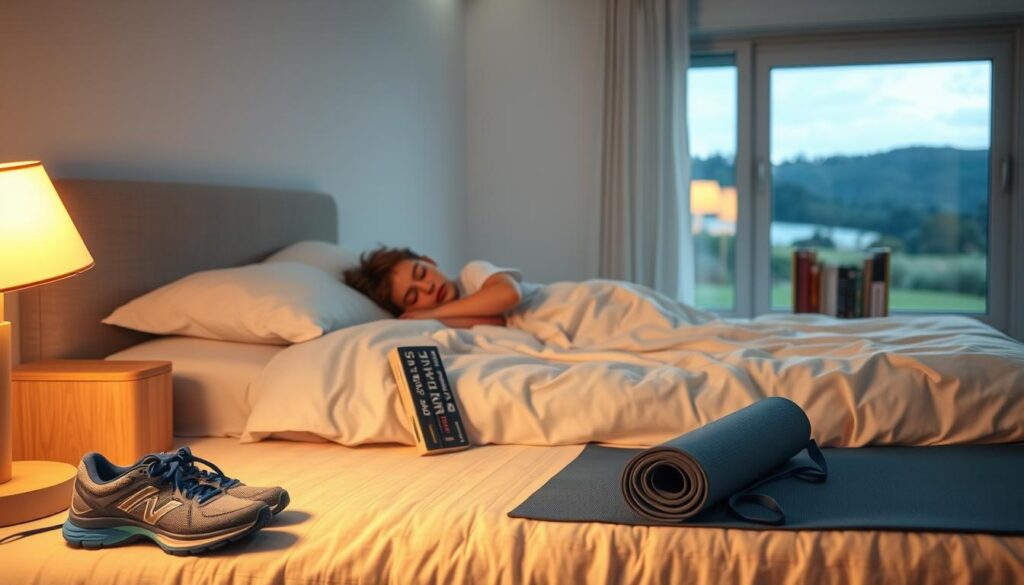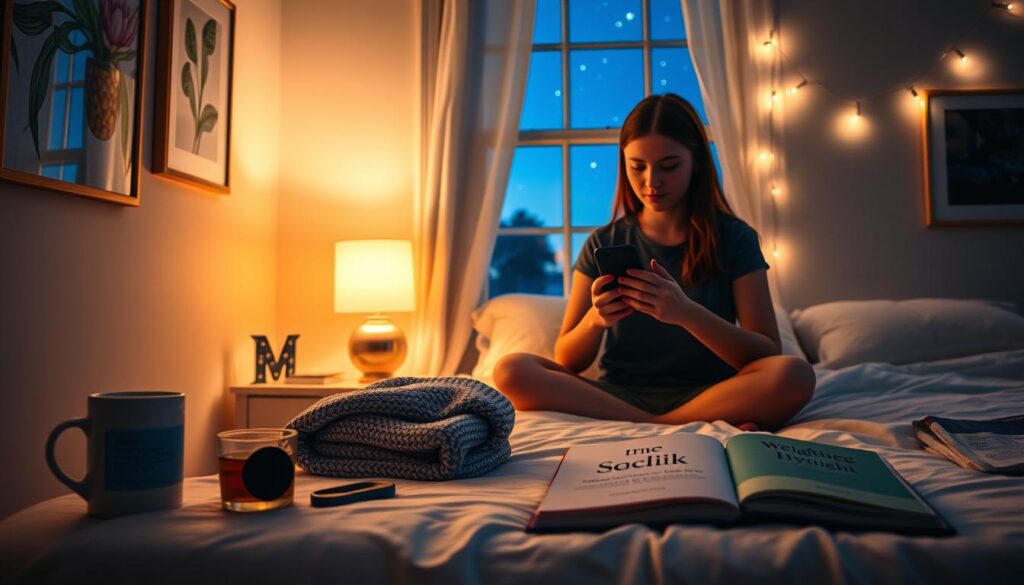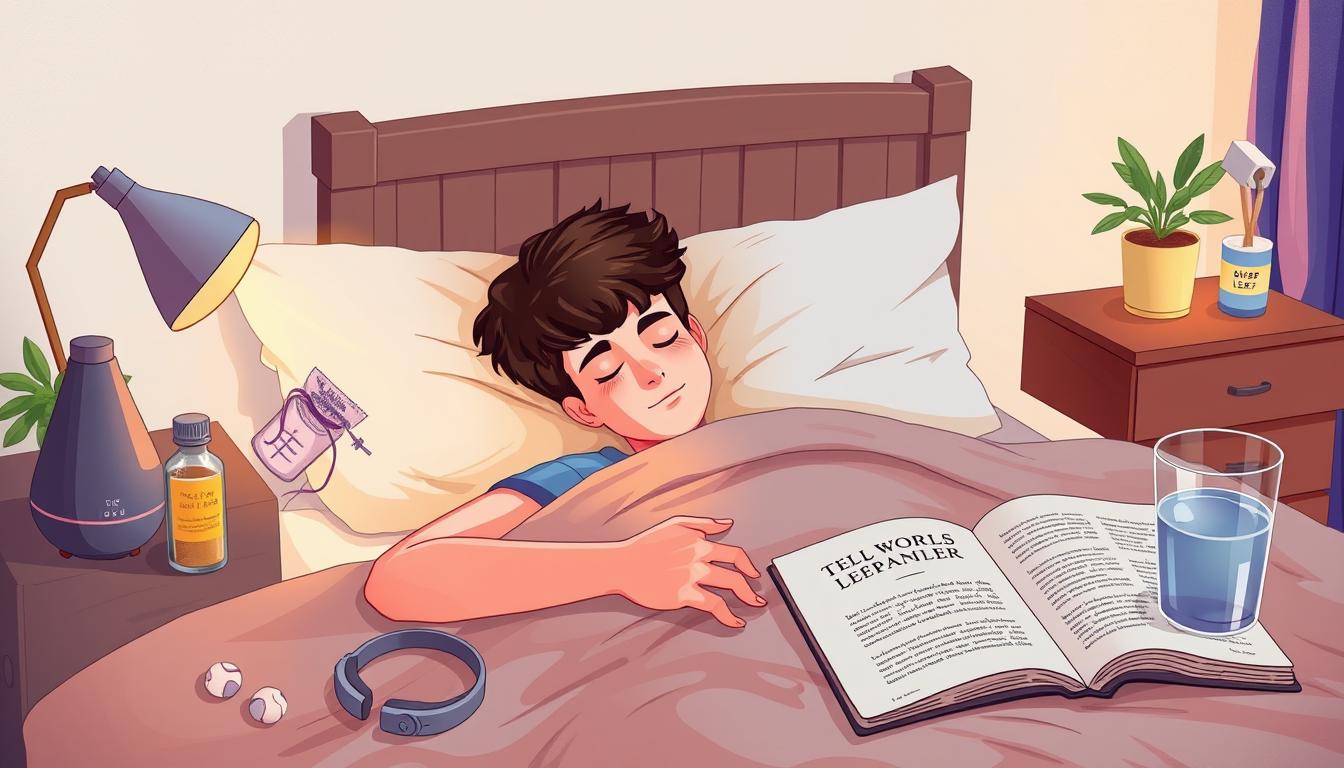Teens today face many challenges getting enough rest. School, screens, and stress often disrupt their sleep. This article explores the best sleep aids for teenagers that don’t involve pills. Learn how natural methods and healthy habits can help them feel more rested.
Quality sleep is vital for growth and mental health. Teens need 8–10 hours each night, but many fall short. This guide breaks down simple steps to improve sleep naturally. From bedtime routines to diet choices, discover practical solutions tailored for young people.
Key Takeaways
- Good sleep boosts focus and mood for teens.
- Natural methods work as effective sleep aids for teenagers.
- Common myths about sleep habits are addressed.
- Simple lifestyle changes can make a big difference.
- Experts recommend avoiding screens before bed.
Understanding Teen Sleep Patterns
Teens’ sleep needs differ from adults due to natural biological changes. During puberty, their bodies shift to stay awake later and sleep in later, a pattern called delayed sleep phase. This shift affects school schedules and daily routines, making quality rest a challenge. For some, teenage sleep supplements may help, but understanding the science first is key.
The Science Behind Teen Sleep
Teen brains release melatonin (the sleep hormone) later at night, pushing bedtimes to 11 p.m. or later. This delay clashes with early school start times, causing sleep deprivation. Bright light exposure at night worsens this cycle by suppressing melatonin production.
Common Sleep Challenges and Myths
- Myth 1: Teens just need to try harder to wake up early.
- Myth 2: Caffeine fixes all tiredness.
- Myth 3: All sleep aids are unsafe for teens. (Many teenage sleep supplements are safe when used properly.)
Ignoring these patterns can lead to mood swings, poor focus, and long-term health risks. Consulting a doctor before trying any supplements ensures safe choices tailored to individual needs.
Factors Affecting Teen Sleep Quality
Teens face many obstacles that disrupt rest. Bright screens, busy schedules, and stress all play a role. Let’s break down the main issues impacting their sleep:
- Blue light exposure: Phones and tablets emit light that slows melatonin, the sleep hormone.
- Academic pressure: Tests and deadlines create anxiety, keeping minds alert at night.
- Irregular bedtimes: Weekend all-nighters throw off internal clocks, making falling asleep harder.
- Noisy environments: Loud noises from siblings, traffic, or devices can fragment sleep cycles.
| Factor | Impact |
|---|---|
| Stress | Raises cortisol, delaying sleep onset |
| Unpredictable routines | Disrupts circadian rhythm |
| Bedroom lighting | Dim light signals bedtime, bright light delays sleep |
Natural remedies for teen sleep often address these issues. For example, calming routines or dark bedrooms help reset sleep patterns. Next sections explore how small changes can improve rest without medication.
Natural Remedies for Teen Sleep
Natural remedies offer safe ways to improve sleep without medication. Many top sleep aids for young adults use plants and scents to calm the mind and body. Try these easy methods to unwind before bed.
Herbal Solutions for Relaxation
Herbs have been used for centuries to promote calmness. Here are a few options:
- Chamomile tea: Sip a warm cup to ease stress.
- Valerian root: Talk to a parent or doctor before trying capsules.
- Lemon balm: A tea option to relax nerves.
Aromatherapy and Sleep Improvement
Scents like lavender can signal the brain it’s time to rest. Use these oils safely:
| Essential Oil | Best For | Usage Tips |
|---|---|---|
| Lavender | Reducing anxiety | Add 2 drops to a diffuser or pillow. |
| Cedarwood | Deep sleep cycles | Massage diluted oil into the soles of feet. |
| Bergamot | Relaxing the mind | Use in a warm bath 30 minutes before bed. |
Always check product labels and start with small doses to avoid overstimulation. These methods are part of the top sleep aids for young adults that support better rest naturally.
Lifestyle Adjustments for Better Sleep
Small shifts in daily habits can turn teenage insomnia solutions into reality. Start with consistent routines and tech-free evenings to reset sleep patterns naturally.
Establishing a Consistent Bedtime Routine
A regular schedule trains the body to unwind. Follow these steps:
- Pick a bedtime and wake-up time, even on weekends.
- Include calming activities like reading or journaling 30 minutes before bed.
- Avoid caffeine and heavy meals 4–6 hours before sleep.
Reducing Screen Time Before Bed
Blue light from screens delays melatonin production. Try these fixes:
- Set a “screen curfew” one hour before bed.
- Use night mode settings on devices to cut blue light exposure.
- Replace scrolling with activities like puzzles or listening to soft music.
| Action | Benefit |
|---|---|
| Fixed bedtime | Strengthens sleep-wake cycle |
| No screens before bed | Reduces sleep disruption |
| Wind-down activities | Signals brain it’s time to rest |
The Role of Diet in Teen Sleep Improvement
Diet plays a key role in how well adolescents rest. Foods rich in magnesium and melatonin act as effective sleep aids for adolescents. Nuts like almonds, spinach, and whole grains boost magnesium levels, which relax muscles. Tart cherries and bananas contain natural melatonin to signal bedtime readiness.
- Choose wisely: Snack on a handful of walnuts or a small bowl of oatmeal before bed.
- Avoid stimulants: Caffeine in sodas or chocolate can delay sleep cycles.
- Timing matters: Heavy meals within two hours of bedtime disrupt digestion.
“A balanced evening snack can make a world of difference,” says Dr. Lisa Henderson, a pediatric sleep specialist. “Pairing carbs with protein—like yogurt and berries—supports sleep hormones naturally.”
Hydration is also key. Drink water instead of sugary drinks. Herbal teas like chamomile calm the body without caffeine. Small adjustments to eating habits turn meals into effective sleep aids for adolescents, supporting overall rest without relying on medication.
Physical Activity and Sleep Benefits
Physical activity is a powerful safe sleep aid for teens, boosting both energy during the day and restfulness at night. Regular exercise helps regulate the body’s natural rhythms, making it easier to fall asleep and stay asleep.
“Exercise is one of the most effective non-medical tools to improve sleep quality in adolescents,” says Dr. Sarah Lee, a sleep specialist at National Sleep Foundation.

How Exercise Promotes Restful Sleep
When teens engage in physical activity, their body temperature rises and then drops later, signaling to the brain it’s time to rest. This process increases melatonin, a hormone key for sleep. Activities like running, cycling, or team sports also reduce stress hormones like cortisol, calming the mind.
Timing Your Activity for Optimal Results
- Work out 3-4 hours before bedtime to avoid post-exercise adrenaline spikes.
- Choose morning or afternoon workouts for better nighttime relaxation.
- Incorporate yoga or stretching before bed to ease into sleep mode.
Making exercise a habit doesn’t require a gym membership. A 30-minute walk, dance session, or even household chores count. Combining physical activity with other safe sleep aids for teens—like limiting screens and a consistent bedtime—creates a winning routine. Active teens sleep deeper, wake up more refreshed, and feel more focused during the day.
Best sleep aids for teenagers
Many teens turn to recommended sleep supplements for teenagers to support better rest. These products often include natural ingredients like melatonin, magnesium, or chamomile. When choosing, prioritize quality and safety over cost.
| Product | Key Ingredients | Benefits |
|---|---|---|
| Now Foods Melatonin | Melatonin 3mg | Supports sleep cycle regulation |
| Nature’s Way Valerian Root | Valerian Root Extract | Promotes relaxation and calmness |
| Source Naturals Calm Breeze | Lavender + Chamomile | Reduces stress before bedtime |
- Always check for third-party testing labels (like NSF certification).
- Start with low doses and monitor responses.
- Pair supplements with consistent sleep routines for best results.
Before trying any recommended sleep supplements for teenagers, teens should discuss options with a healthcare provider. Supplements work best when combined with good sleep hygiene practices like dimming screens and keeping rooms cool.
Teenage Sleep Supplements and Their Benefits
When considering best sleep aids for teenagers, supplements can offer targeted support without relying solely on lifestyle changes. Many options use natural ingredients proven to promote relaxation and better sleep cycles. However, choosing the right product requires understanding what’s inside.
- Melatonin: A hormone that regulates sleep-wake cycles.
- Valerian Root: An herb used for centuries to calm the nervous system.
- Magnesium Glycinate: A mineral that eases muscle tension and anxiety.
Understanding Key Ingredients
Supplements often combine these elements to address multiple aspects of sleep disruption. For instance, melatonin helps reset circadian rhythms, while magnesium reduces stress-induced restlessness. Always check for third-party testing to ensure purity and dosage accuracy.
Safety and Efficacy of Supplements
Supplements aren’t one-size-fits-all. A recent study by the Journal of Adolescent Health found 68% of teens saw improved sleep with melatonin under medical guidance. However, interactions with medications or health conditions can occur. Below compares common options:
| Ingredient | Benefits | Safety Notes |
|---|---|---|
| Melatonin | Aligns sleep cycles | Short-term use recommended |
| Valerian Root | Reduces insomnia symptoms | Possible drowsiness next morning |
| Magnesium | Supports muscle relaxation | Safe but avoid excessive doses |
Consult a pediatrician before starting any supplement. Prioritize transparency in labeling and stick to brands like Natrol or Nature’s Way, which follow FDA guidelines. Remember, supplements work best when paired with consistent bedtime routines.
Effective Sleep Aids for Adolescents Explained
Selecting the right sleep aids can help teens sleep better. Approaches like teenage sleep supplements and lifestyle changes work best when combined:
- Consistent sleep schedules every night
- Calming bedtime routines with relaxation techniques
- Teenage sleep supplements containing melatonin or magnesium
| Approach | How It Works | Pros | Cons |
|---|---|---|---|
| Supplements | Address nutrient gaps or imbalances | Targeted relief for sleep issues | Potential side effects |
| Lifestyle Adjustments | Support natural sleep rhythms | No long-term risks | Requires daily discipline |
Pairing supplements with healthy habits often yields the best results. Always talk to a healthcare provider before starting teenage sleep supplements to ensure they’re safe and right for the individual.
Safe Sleep Aids for Teens: What to Consider
Choosing the right sleep aids for teens requires careful thought. Before trying any product, safety must come first. Natural remedies for teen sleep can work well, but they’re not one-size-fits-all. Here’s how to make smart choices.
Consulting Healthcare Providers
Start by talking to a doctor or pediatrician. They can:
- Check for health conditions affecting sleep
- Recommend safe natural remedies for teen sleep
- Review medications or supplements for interactions
Avoiding Over-the-Counter Risks
Many OTC sleep aids contain caffeine or stimulants that worsen sleep. Risks include:
- Unwanted side effects like dizziness
- Long-term dependency
- Hidden ingredients not listed on labels
“Always discuss OTC use with a medical expert first,” says Dr. Lisa Carter, a teen sleep specialist. “Natural options like chamomile tea or lavender oil are safer when used correctly.”
Opt for proven natural remedies for teen sleep like melatonin in small doses or calming bedtime routines. Prioritize options backed by medical advice to protect long-term health.
Natural Remedies vs. Supplementation: A Comparison
Deciding between natural methods and supplements? Let’s break down the options to find the best fit for your teen’s needs.
| Aspect | Natural Remedies | Supplements |
|---|---|---|
| Speed of Results | Gradual improvements | Quick action |
| Cost | Affordable (e.g., chamomile tea) | Varies by brand (e.g., Now Foods melatonin) |
| Risk of Side Effects | Low to none | Potential dependency risks |
Pros and Cons of Each Approach
Natural options like lavender oil or meditation offer gentle, long-term benefits. Supplements like magnesium tablets can target sleep issues faster but require careful dosing. Always check labels for purity and age guidelines.
Choosing the Right Option for Your Teen
- Severity: Try natural methods first for mild issues. Supplements if needed.
- Preferences: Teens preferring routines may prefer herbs; others might opt for quick fixes.
- Consult a doctor: Especially before trying supplements like valerian root capsules.
Combining both could work best. For example, using a weighted blanket (natural) with a melatonin supplement from brands like Nature’s Bounty. Prioritize safety and consistency when selecting from the top sleep aids for young adults.
Integrating Sleep Aids into a Daily Routine
Building a routine is key to overcoming teenage insomnia. Teenage insomnia solutions work best when woven into daily life. Start small and steady—like adding a 10-minute wind-down ritual—to build lasting habits.

- Plan sleep aids around existing schedules. For example, pair a warm herbal tea with homework-free evenings.
- Combine methods. Use calming music during homework breaks and a bedtime stretch routine.
- Track progress. Note what helps most—like cutting screen time after 9 PM—and stick to what works.
Flexibility matters. Adjust based on school demands or social activities. Even minor changes, like dimming lights an hour before bed, can make a difference. Over time, these steps turn into habits that fight sleeplessness naturally.
Additional Tips for Managing Teenage Insomnia
Effective sleep aids for adolescents often combine mental and physical strategies. Small changes to routines and surroundings can make a big difference. Let’s explore ways to calm the mind and improve sleep spaces.
Mindfulness Practices to Try
Simple techniques can reduce stress and ease the mind. Try these steps:
- Deep breathing exercises for 5–10 minutes before bed
- Meditation apps like Calm or Headspace for guided sessions
- Writing in a journal to release daily worries
Creating a Restful Environment
A calm bedroom sets the stage for better sleep. Here’s how to adjust the space:
“A dark, quiet room with the right temperature is vital for healthy sleep cycles.” — National Sleep Foundation
Keep the room cool (60–67°F), use blackout curtains, and add a white noise machine. Soft lighting and a tidy bed area signal it’s time to relax. These steps work alongside other effective sleep aids for adolescents to address insomnia holistically.
Conclusion
Healthy sleep habits are vital for teens’ growth and daily performance. This article explored natural solutions like aromatherapy, consistent routines, and screen-free evenings. Physical activity and mindful eating also boost sleep quality. When considering safe sleep aids for teens, prioritize approaches that avoid medications. Supplements like melatonin or herbal blends can be part of the plan, but always check with a doctor first.
Recommended sleep supplements for teenagers should align with their unique needs. Combining these tools with calming environments and stress-reducing practices creates a stronger path to restful nights. Small adjustments like evening walks or bedtime routines add up over time. By focusing on holistic strategies, teens can build habits that support better sleep without relying on pills. Always involve a healthcare provider to ensure safety and effectiveness.
FAQ
What are some of the best sleep aids for teenagers?
Some of the best sleep aids for teenagers include natural supplements like melatonin, herbal teas such as chamomile, and essential oils like lavender. Additionally, lifestyle changes like establishing a consistent bedtime routine and reducing screen time can greatly contribute to better sleep quality.
Are teenage sleep supplements safe to use?
Yes, many teenage sleep supplements are safe when used as directed. It’s essential to consult with a healthcare provider to ensure the chosen supplement is appropriate for your teen. Look for products made with natural ingredients and avoid any with potentially harmful additives.
What natural remedies for teen sleep are recommended?
Recommended natural remedies for teen sleep include herbal supplements like valerian root, magnesium-rich foods, and the use of aromatherapy. Creating a calming bedtime routine with relaxing activities, such as reading or gentle stretching, can also help improve sleep quality.
How can lifestyle adjustments help with teenage insomnia?
Lifestyle adjustments like enforcing a regular sleep schedule, minimizing caffeine intake, and creating a comfortable sleep environment can significantly reduce teenage insomnia. Encouraging physical activity and mindfulness practices before bed can also promote better sleep.
What should teenagers avoid for better sleep?
Teenagers should avoid consuming caffeine and heavy meals close to bedtime, as well as using electronic devices that emit blue light. Reducing stress and engaging in relaxing activities before sleep can also help create a more conducive sleep environment.
How do diet and nutrition influence sleep for teenagers?
Diet plays a crucial role in sleep quality. Foods high in magnesium, such as nuts and leafy greens, as well as those rich in melatonin like cherries, can promote better sleep. It’s essential to limit sugary snacks and beverages that can disrupt sleep patterns.
What is the role of physical activity in sleep quality for teens?
Regular physical activity is known to improve sleep quality for teenagers. Exercise helps regulate the body’s internal clock and reduces stress. However, it’s best to avoid vigorous exercise close to bedtime, as it can be stimulating and keep them awake.
Are there any specific sleep aids for young adults?
Yes, many sleep aids formulated for young adults include melatonin, valerian root, and L-theanine. These supplements are designed to support their unique sleep needs. It’s always advisable to consult with a healthcare professional before starting any new supplement.
What should I consider when choosing sleep aids for my teen?
When choosing sleep aids for your teen, consider their specific sleep issues, look for natural and safe options, and ensure the product is well-reviewed. Consulting with a healthcare provider can also help tailor options that suit their individual needs.
Can mindfulness techniques help solve teenage sleep issues?
Yes, mindfulness techniques such as meditation and deep breathing exercises can help reduce anxiety and promote relaxation, making it easier for teens to fall asleep. These practices can be excellent tools for managing stress and enhancing overall sleep quality.
